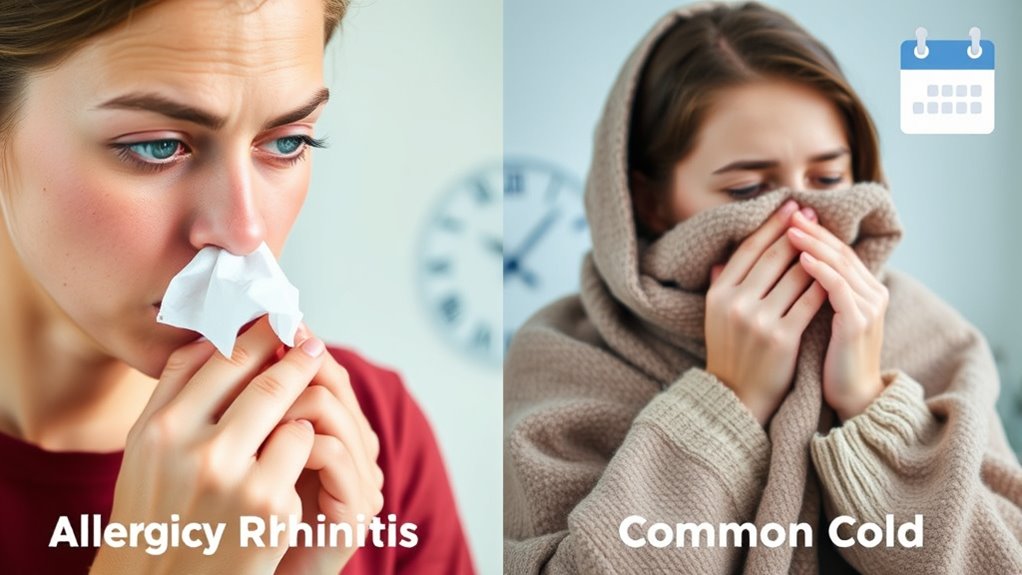If you notice sneezing, itchy eyes, and a clear runny nose, you’re likely dealing with allergic rhinitis, which is caused by allergens like pollen or dust. Cold symptoms often include body aches, sore throat, and thicker mucus. Allergies tend to persist or recur with exposure and rarely involve fever. Knowing these differences can help you manage symptoms better. Keep exploring to find out more about how to tell them apart and get relief.
Key Takeaways
- Allergic rhinitis causes itchy eyes, nose, and throat, with clear, watery mucus; colds often cause thick, colored mucus and sore throat.
- Cold symptoms typically include body aches, fatigue, and fever; allergies rarely cause fever or body aches.
- Allergic reactions are triggered by allergens like pollen, dust, or pet dander, often seasonal or year-round; colds are caused by viruses.
- Allergic rhinitis tends to be persistent and recurrent with sneezing and itching; colds usually last about a week with body aches and sore throat.
- Immediate medical attention is needed for severe breathing difficulties or sudden symptom changes, more common in cold complications or allergic reactions.
Symptoms and How They Differ

While allergic rhinitis and the common cold share some symptoms, they have distinct signs that can help you tell them apart. With allergic rhinitis, sneezing tends to be frequent and often occurs in bouts, especially after exposure to allergens. You might experience itchy eyes, nose, or throat, which is uncommon with a cold. A runny nose from allergies usually produces clear, watery mucus, whereas a cold can cause thicker, yellow or green nasal discharge. Cold symptoms often include body aches, sore throat, and fatigue, which are less typical in allergies. Fever is rare with allergic rhinitis but common with colds. Recognizing these differences can guide you toward the right treatment and help you manage your symptoms more effectively. Additionally, understanding the financial impact of health conditions can inform better healthcare decisions.
Causes and Triggers

Allergic rhinitis is caused by your immune system overreacting to allergens like pollen, dust mites, mold, or pet dander. When you encounter these triggers, your immune system mistakenly sees them as threats and releases chemicals like histamine, leading to allergy symptoms. Common triggers vary based on your environment and lifestyle. Outdoor allergens tend to include pollen from trees, grasses, and weeds, especially during specific seasons. Indoor triggers often involve dust mites, mold spores, or pet dander from cats and dogs. Factors such as pollution and cigarette smoke can also worsen symptoms. Recognizing these triggers helps you avoid or minimize exposure, reducing the severity of allergic reactions. Being aware of what causes your symptoms is key to managing allergic rhinitis effectively. Additionally, portable camping gear like tents, power banks, and solar panels can enhance outdoor experiences while managing allergy symptoms in various environments.
Duration and Pattern of Illness

The duration and pattern of allergic rhinitis symptoms can vary depending on the type and exposure to allergens. If you’re allergic to pollen, symptoms may appear seasonally, lasting weeks during peak pollen times. Perennial allergies, like dust or pet dander, can cause year-round symptoms that fluctuate with exposure levels. You might notice symptoms intensify after exposure and improve when away from allergens. Unlike the common cold, which usually lasts about a week and follows a distinct progression, allergic rhinitis tends to be persistent or recurrent, often matching your allergen contact. You may experience ongoing nasal congestion, sneezing, and itchy eyes as long as you’re exposed. Recognizing these patterns helps distinguish between the two conditions and guides appropriate management. Additionally, understanding the tax implications of allergic rhinitis treatments can influence your healthcare choices and costs.
Additional Signs and Indicators

In addition to differences in duration and pattern, several signs can help you distinguish allergic rhinitis from a common cold. You might notice that allergic rhinitis often causes itchy eyes, nose, or throat, which isn’t typical with a cold. Sneezing in allergic reactions tends to be more frequent and persistent. Clear, watery nasal discharge is common in allergies, whereas colds may produce thicker, colored mucus. You may also experience swelling around your eyes and dark circles due to inflammation. Additionally, allergy symptoms often worsen in specific environments or seasons, while colds are more likely to follow exposure to viruses. Recognizing these signs can guide you toward the right treatment and help you understand whether allergies or a cold is causing your symptoms. Regular use of Glycolic Acid in skincare routines can help improve skin texture and reduce visible pores, which may be beneficial if you experience inflammation or skin irritation from allergy symptoms.
Impact on Daily Life

Both allergic rhinitis and the common cold can considerably disrupt your daily routine, but allergies often have a more persistent impact. With allergies, you might find yourself dealing with ongoing symptoms like sneezing, nasal congestion, and itchy eyes that linger for weeks or even months. This can make concentrating at work or school harder and drain your energy. You may also avoid outdoor activities or social events to prevent flare-ups, leading to social isolation. The constant discomfort can affect your sleep quality, leaving you tired and less productive. Unlike a cold, which usually resolves within a week or two, allergies require ongoing management, constantly reminding you of their presence and interfering with your normal daily activities. Incorporating antioxidant-rich foods into your diet may help support your immune response and reduce allergy symptoms.
Treatment Options and Relief Strategies

Managing allergic rhinitis and the common cold requires different approaches to find relief. For allergic rhinitis, antihistamines, nasal sprays, and avoiding triggers can help reduce symptoms. You might also consider using decongestants or saline nasal rinses to clear nasal passages. For the common cold, rest, hydration, and over-the-counter remedies like pain relievers and throat lozenges are your best options. It’s important to tailor your treatment to your specific symptoms and avoid self-medicating without guidance.
Managing allergies and colds requires tailored treatments and careful symptom management.
Here are some relief strategies:
- Use antihistamines for allergy symptoms
- Stay hydrated and rest when sick
- Apply saline nasal sprays or rinses
- Take over-the-counter pain relievers for cold discomfort
When to Seek Medical Advice

If your symptoms stick around longer than usual or worsen, it’s time to see a doctor. Sudden changes in how you feel should also prompt medical attention. If you’re having trouble breathing, seek help immediately. Remember, some essential oils can cause skin irritation if not used properly, so exercise caution.
Persistent Symptoms Warranting Care
Persistent symptoms that last beyond two weeks or worsen despite treatment should prompt you to seek medical advice. If your condition doesn’t improve or if symptoms intensify, it’s important to obtain professional evaluation. Persistent issues may indicate underlying allergies, infections, or other health concerns needing targeted treatment. You should consider consulting a healthcare provider if you experience:
- Symptoms lasting longer than three weeks
- Fever over 101°F or worsening chills
- Severe facial pain or swelling
- Difficulty breathing or persistent wheezing
- Unresolved symptoms that do not respond to initial care or worsen over time
Ignoring ongoing symptoms can lead to complications or misdiagnosis. Early medical assessment ensures proper diagnosis and effective management, helping you avoid unnecessary discomfort and potential health risks. If your symptoms fit these criteria, don’t delay seeking professional help.
Sudden Symptom Changes Alert
Sudden changes in your symptoms can indicate a serious problem that requires prompt medical attention. If you notice a rapid worsening of your nasal congestion, a high fever that spikes suddenly, or intense facial pain, don’t wait—seek help immediately. Sharp or new symptoms, such as difficulty swallowing, severe headache, confusion, or vision changes, are warning signs. These may signal infections or other complications needing urgent care. Also, if you experience shortness of breath, chest tightness, or swelling around your face or throat, get emergency assistance right away. Trust your instincts—any abrupt or severe symptom change could be a sign of a serious condition. Being aware of your contrast ratio and how it affects your visual experience can also help you recognize when your symptoms might be linked to underlying issues. Acting quickly can prevent complications and ensure you get the appropriate treatment.
Breathing Difficulties Require Help
Breathing difficulties should never be ignored, as they can quickly become serious. If you notice any of these signs, seek medical help immediately:
- Shortness of breath that worsens or doesn’t improve
- Wheezing or a high-pitched sound when breathing
- Tightness or pain in your chest
- Bluish tint to lips or face
These symptoms may indicate a severe allergic reaction or respiratory issue that needs prompt attention. Don’t delay calling emergency services if you experience sudden or severe breathing problems. Even if symptoms seem mild but persist or worsen, consult a healthcare professional promptly. Quick action can prevent complications and ensure you get the appropriate treatment. Remember, breathing is essential, so take any difficulty seriously. Incorporating sound therapy principles can also support relaxation and reduce anxiety during recovery.
Frequently Asked Questions
Can Allergies Cause a Fever?
You might wonder if allergies can cause a fever. Generally, allergies don’t lead to a fever because they’re immune responses to allergens, not infections. Fever usually indicates your body fighting off a virus or bacteria. However, severe allergic reactions or related sinus infections can sometimes cause a slight increase in temperature. If you have a fever alongside allergy symptoms, it’s best to see a healthcare professional to rule out other causes.
Are There Any Long-Term Health Risks?
Imagine a quiet room filled with dust or mold, and your body’s immune system constantly fights these irritants. Long-term, this can lead to persistent discomfort, sinus issues, or even asthma development. You might overlook ongoing symptoms, but if untreated, they could worsen and impact your quality of life. Regular check-ups and managing triggers help prevent these risks, ensuring you stay healthier and more comfortable over time.
How Can I Prevent Allergic Reactions?
To prevent allergic reactions, you should identify and avoid your triggers, like pollen, dust, or pet dander. Keep your living space clean, use air purifiers, and wash bedding regularly. Wear masks outdoors during high pollen seasons, and consider allergy medications or consulting an allergist for personalized advice. By taking these steps, you can reduce your chances of experiencing allergic reactions and manage symptoms more effectively.
Do Symptoms Improve With Age?
As you navigate life’s journey, you might find that your symptoms gently fade over time, offering a sense of relief and hope. While some people notice improvements with age, others may experience persistent challenges. Your body’s unique story influences how symptoms evolve, and staying attentive to changes allows you to manage them better. Embrace this phase with patience and care, knowing that your resilience can lead to greater comfort and well-being.
Can Both Conditions Occur Simultaneously?
Yes, both conditions can occur at the same time, making diagnosis tricky. You might experience symptoms like sneezing, congestion, and a runny nose from a cold, while allergies can cause itchy eyes and throat. When both happen, you’ll notice overlapping signs, which can confuse you. It’s important to see a healthcare professional to determine whether you need allergy medication, cold remedies, or both, for effective relief.
Conclusion
Understanding the differences between allergic rhinitis and the common cold helps you recognize what’s truly bothering you. Remember, your body’s signals are like a compass guiding you to the right treatment. Don’t let confusion turn into frustration—listen closely and act wisely. When in doubt, seek medical advice; after all, your health is the treasure map leading to better days. Stay informed, stay proactive, and let clarity be your guiding star.









